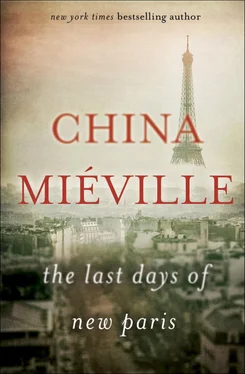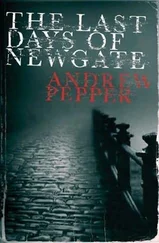A second percussion sounds, a quieter, crackling blast in another room close by, and he cowers. But it is quickly gone and Thibaut rises again.
“I got through to them,” Sam whispers. Thibaut’s ears are ringing but he can hear her. “This little gate cracked open. I got it wider.” With the energies of sacrifice. With what she did to Alesch. “They had to come up for this. For that… thing.”
She leans against a wall. Sparks burst from the machinery. A few researchers are still alive, are moving, crawling in the dust. “That,” Sam shouts at them, “was definitely against the fucking treaties. ”
“You said they… your bosses… couldn’t intervene,” Thibaut says. “Or wouldn’t.”
“There was a block in place. You saw what the priests were doing until the manif… stopped them. And my bosses wanted to avoid confrontation. But I got through. And they couldn’t let that lie. There’ll be a serious diplomatic incident.”
Thibaut laughs at that a long time, hurting his wound. Even Sam smiles.
—
They stumble through the ruin while the Germans still alive crawl away from them. When he reaches it, Thibaut hesitates, then picks up the exquisite corpse’s head.
It is half as big again as his own, but fleshy and light as papier-mâché. It moves its eyes to watch him, sadly. Some last bolus of life. The train in its beard makes a little hffhffhff sound. The caterpillar does not pulse.
They go into the hallway. At the end is a cell containing a pile of terrible objects. Farmyard pieces, a rotting elephant head, leaves, tennis rackets, big-eyed fish, limbs, a pistol, a tiny figurine, a pile of saucepans, a globe.
“Those are all from exquisite corpses,” Thibaut says. A charnel heap of components, a grave of ripped-up manifestation. Opposite them is another bank of machines, an engine and a single bunk like a prisoner’s. Thibaut’s stomach heaves at the smell of decaying image.
“They’ve been harnessing what bleeds out of the manifs,” Sam says.
Three walls are cracked, chaotic. One side of the room is perfectly neat, perfectly, unnaturally tidy. Its window is unbroken, its wall papered.
“I heard another noise from here,” Thibaut says. He sifts through the pile with the barrel of his rifle. He probes with his hand and the soft decay of actualized dream fouls his fingers.
Sam smiles and Thibaut does not smile back. He is thinking of the Main à plume who died. He looks at the flawless wall.
“It must have just kicked out a lot of energy when your bosses blew up that thing,” Thibaut says.
She says, “It was an abomination.”
—
I saved Paris, Thibaut makes himself think. Destroyed a new utter demon. I saved the world. He feels flat. Outside, the sunlight hits them differently than it did within the old city.
Is this it? Are they done?
“Where are the soldiers?” he says.
They stagger on, alone and unmolested. They strain to hear attackers they are sure must be coming, but there is nothing. Relieved, confused, straining to stay alert, Thibaut and Sam haul past dirty broken buildings and rubbled corners. They keep their weapons in their hands in these ghost neighborhoods stained by war, wandering, Thibaut realizes, back toward the old arrondissements.
And then abruptly they are in a jarringly perfect stretch of Paris. The loveliest town and houses. Perfect fronts, vibrant colors, crackless. Even the sky seems brighter.
Sam and Thibaut come to a bewildered stop. Where is everyone? And how is this quarter so clean?
The streets are empty, the sun is high, the shadows are small. The streets feel scoured.
Why don’t we have to stay down? Thibaut thinks they should be creeping through the shells of buildings. Where are soldiers? He looks at pretty houses without war damage.
“Something doesn’t make sense,” Thibaut says.
“Really?” Sam says. “Just one thing?”
They walk on a long time. Immaculate undamaged streets. They see no one.
They pass a big hotel. It is picturesque, spotless, deserted.
“The thing is, Fall Rot was already awake,” Thibaut says slowly. “Maybe it wasn’t him that they were having trouble manifesting. That they were sacrificing things for. They wrote there was something like that, right? That they had trouble with, trying to bring up. But Fall Rot was already manifest. Maybe they realized they couldn’t make Fall Rot work. Maybe they were even trying to get rid of it, but they couldn’t kill it. But what if it was something else they couldn’t invoke. Until Fall Rot was taken down.” Sam is still. “By your bosses. You heard that noise. There was a lot of energy when Fall Rot died, for sure. Maybe enough, at last, for whatever.
“When you killed it,” Thibaut says, “maybe that was like another sacrifice.”
He looks into the eyes of the manif head he still carries. “If killing an exquisite corpse feeds Fall Rot,” he whispers, “what does killing Fall Rot feed?”
Sam and Thibaut look at each other. Neither speaks.
They begin to run. Through streets that aren’t just too scrubbed, too perfect, too empty for these times, but that have never looked as they do now. That do not look real. Thibaut feels like a stain, a smut of dirt.
“We thought it was manifs to feed demons,” Sam says. “What if it’s the other way? And they’ve been trying to call up a manif ?”
Of what power?
They have been experimenting to control such art. Wolf-tables rallying to the whip. The brekerman, obeying orders as it collapsed.
“They’ve been trying to summon something,” Sam says. They hear gunshots. “In secret. And failing.”
“Only,” Thibaut says, “we succeeded.”
On the rue de Paris, running west toward the edge of the twentieth arrondissement, they see at last the rise of the city barricade at the end of this strange chintz. There by the German positions, jeeps, guns, mortars, the ready troops, the city is abruptly chaotic again, grime and imperfection again, smashed apart and becoming dust.
Between them and the waiting Nazi guards, where the walls change, is a slight figure in a brown suit.
The young man walks slowly toward the old city, as if in a dream or a slowed-down film. His footsteps take too long to land. He wears archaic clothes, trousers that balloon out from pulled-up socks. His hair is a strange pale parted black.
Sam has gone quite white. She says, “No.” As the young man approaches them, the German troops fire.
And Thibaut almost falls in astonishment because he sees the man unconcerned by any of the bullets that hit him, he sees him look hard at the closest shooter. And where the man looks, a house rises.
Emerging instantly from nothing, clean, freshly painted, fussily rendered, pale, almost translucent. And the soldier, all the soldiers who were where the house is now are just gone. Replaced, with a sweep of attention, disappeared from this scene.
The façades of Paris reappear, as the figure stares, and they are prettier and more perfect than they have ever looked, and they are quite empty.
“It was never Fall Rot,” says Sam. “Kill Fall Rot and we have called up a manif. Oh dear God. It’s bringing a city.”
The young man makes it with every look, is reestablishing Paris in pastel outlines, no not reestablishing but establishing newly, a simpering pretense, as it had never been. A cloying imaginary.
“They’ve found a self-portrait,” Sam says.
The last of the Nazi soldiers are scattering before the annihilating gaze finds them. Now the young man is turning slowly back toward Thibaut and Sam.
“He never could paint people,” Sam whispers. “He always left them out. Painted everything empty. Even when he drew himself, he couldn’t do features…”
Читать дальше












